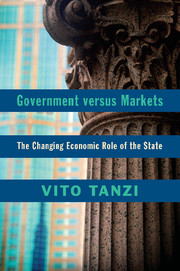Book contents
- Frontmatter
- Contents
- Preface
- PART ONE THE ECONOMIC ROLE OF THE STATE
- PART TWO HISTORICAL REVIEW
- PART THREE THEORETICAL AND ANALYTICAL ISSUES
- 7 Theories of Public-Sector Behavior
- 8 Voluntary Exchange and Public Choice Theories
- 9 The Nordic European Economic Theory of Fiscal Policy
- 10 Policy Tools and Government Roles
- PART FOUR THE OUTCOME OF STATE INTERVENTION
- PART FIVE ON THE ECONOMIC ROLE OF THE STATE IN THE FUTURE
- Notes
- Index
- References
10 - Policy Tools and Government Roles
Published online by Cambridge University Press: 07 October 2011
- Frontmatter
- Contents
- Preface
- PART ONE THE ECONOMIC ROLE OF THE STATE
- PART TWO HISTORICAL REVIEW
- PART THREE THEORETICAL AND ANALYTICAL ISSUES
- 7 Theories of Public-Sector Behavior
- 8 Voluntary Exchange and Public Choice Theories
- 9 The Nordic European Economic Theory of Fiscal Policy
- 10 Policy Tools and Government Roles
- PART FOUR THE OUTCOME OF STATE INTERVENTION
- PART FIVE ON THE ECONOMIC ROLE OF THE STATE IN THE FUTURE
- Notes
- Index
- References
Summary
Introduction
Generally, a large government role in the economy tends to be associated with a high ratio of public spending into gross domestic product. This, for example, is what characterizes welfare states. The level of public spending in the economy has been the focus of the historical discussion in the second part of this book. However, the state can play its role using policy instruments—the xj in equation (2) in Chapter 9—other than public spending, as, for example, it did especially during the period of mercantilism in Europe and during recent decades in countries from Asia and Latin America. In these countries, government spending was relatively low, but the governments were very active in the economy, using other policy tools. As far back as 1790, Edmund Burke had recognized that governments have several instruments available besides public spending to promote their goals. In this chapter, we focus on this aspect, recognizing that different countries rely on different instruments; and that in future decades the relative use of different policy tools or instruments is likely to change. We provide a more complete listing of available tools than normally given in public finance books, accompanied by brief comments on each of them.
To appreciate the importance of this discussion, compare Sweden or Denmark with China. Most observers would agree that in these countries the government plays an overwhelming role in the economy.
- Type
- Chapter
- Information
- Government versus MarketsThe Changing Economic Role of the State, pp. 205 - 226Publisher: Cambridge University PressPrint publication year: 2011



